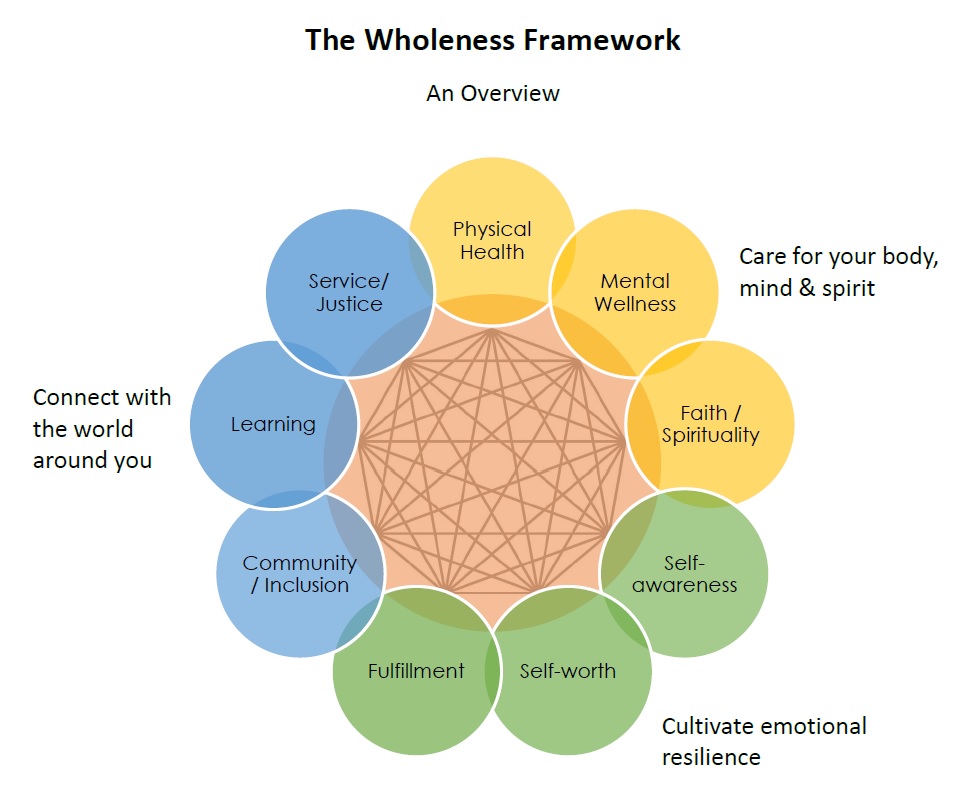Using the Wholeness Framework to Establish a Campus Culture of Wellness
To effectively manage stress and anxiety, students need to be empowered by the whole campus to help themselves and each other.
The Wholeness Framework is a newly developed initiative at Saint Mary’s College that employs systems thinking to help students reduce stress and anxiety while meeting their interconnected daily needs. The framework can empower each individual to find clarity, see new perspectives, and more skillfully navigate the adversities they face in life.
Goals
- Help all students effectively manage stress and reduce anxiety.
- Establish a shared campus vision of what it means to educate the “whole student.”
- Create consistency by using a shared language among all stakeholders, including parents.
- Equip peer mentors and peer coaches with the skills to help first-year students better navigate adversity.
Framework Highlights
- Meets the student exactly where they are at any given moment
- Combines research-based outcomes related to human flourishing and self-worth
- Places equal emphasis on all nine facets of life
- The student can focus on just one facet and still strategically impact all the others
- The student gets to decide how best to meet their ever-changing needs
- The student can create a customized “tool box” of resources to more effectively navigate adversity

"Our generation needs help seeing the challenges of life as opportunities and not as threats to our success.
This framework helps make that shift."
— Sophie, Class of 2020
Tips for Implementation
- Embrace the steps of Design Thinking: Empathize, Define, Ideate, Prototype & Test.
- Find the courage to “fail fast” and adjust.
- Utilize leadership students as mentors and partners every step of the way.
- Walk the walk by inviting staff and administrators to use the same tools being taught to students.
- Let the framework spread organically by using it as a problem-solving tool, rather than a mandate.
Implementation Timeline
- FA19: First cohort of leadership students trained
- FA19: Peer Mentor Program piloted
- SP20: Wholeness Coaching Program pilot begins
- FA20: Framework fully integrated into First-Year Student Orientation experience
- Ongoing: Conversations with a wide variety of campus stakeholders regarding evolution of use
Results Thus Far
- Positive reception and qualitative feedback from leadership and first-year students
- Acknowledgment of potential for positive impact by President’s Cabinet and Board of Trustees
- Increased awareness of beneficial campus resources already available (don’t reinvent the wheel!)
- Identification of gaps in support that can be filled
Anticipated Future Results
- Reduction in student self-reported symptoms of stress and anxiety through Healthy Minds Study
- Increase in self-awareness, intrinsic self-worth and sense of fulfillment
- Increase in student retention
For more information feel free to contact:
Shay Jolly Schneider
Director of Retention and First Year Experience
hjolly@saintmarys.edu
Becky Lindstrom
Life Coaching Consultant
rlindstorm@saintmarys.edu
